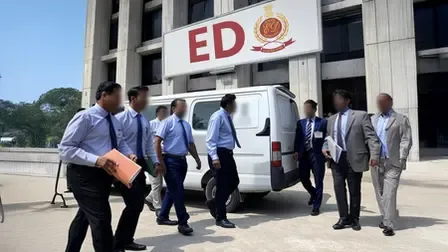Have ED Raids Uncovered Sand-Smuggling in West Bengal?

Synopsis
Key Takeaways
- ED raids have uncovered connections between insurance agents and sand-smuggling.
- The operation signifies a crackdown on illegal trades in West Bengal.
- High demand for sand has led to rampant illegal mining.
- Forged permits are a common tactic used by illegal miners.
- Hawala is a key mechanism for laundering proceeds from illegal activities.
Kolkata, Sep 8 (NationPress) In a significant development, the Enforcement Directorate (ED) officials conducted extensive search operations at the residence of an insurance agent on the southern outskirts of Kolkata concerning sand-smuggling operations in the state. The individual identified is Sanjeev Boyd.
The raid is taking place at his residence located in Regent Colony, situated on the southern fringes of Kolkata.
This marks the fourth location where ED officials have been executing thorough raids since early Monday morning, with the other three sites being in Behala on the southern outskirts of Kolkata, Gopiballavpur in the Jhargram district, and Kalyani in the Nadia district.
At Gopiballavpur, the residence of a sand-trader named Sheikh Zahirul Ali is under scrutiny.
In Behala, search operations are targeting the office of an entity known as G.D. Mining, also engaged in the sand-trading sector.
Each team of raiding ED officials is accompanied by personnel from the Central Armed Police Forces (CAPF).
According to sources, insurance agent Boyd's link to the sand-smuggling operations in West Bengal involves his role in diverting the illicit gains of these rackets overseas via the Hawala system, from which he reportedly earned substantial commissions.
He is notably implicated in managing the profits generated by Sheikh Zahirul Ali from sand-smuggling activities. Information from ED officials suggests that Boyd also assisted Zahirul in investing a fraction of his earnings into insurance policies.
Sources added that Boyd's identity as an insurance agent served merely as a front; his primary income stemmed from commissions related to the diversion of proceeds from various illicit trades abroad through the Hawala route.
This operation marks a historic first for the ED in West Bengal concerning sand-smuggling rackets.
According to estimates from the ED, the sand-smuggling operations in West Bengal are worth hundreds of crores of rupees.
Sources indicated that due to the high demand for sand from the banks of the Subarnarekha River, it is sold in open markets at prices double those set by the government.
Often, the permits for sand mining issued by the state government are forged, enabling illegal mining by racketeers.






